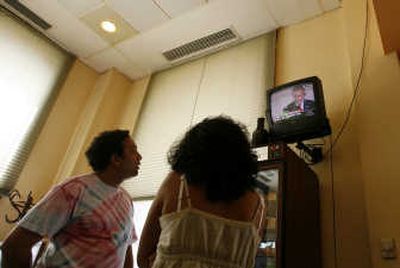Bush tells Cuba to grant freedoms after Castro era

WASHINGTON – Asserting that peaceful pressure is growing on Cuba in response to “the dying gasps of a failed regime,” President Bush on Wednesday called on Cuban authorities to abandon their iron grip and promised U.S. assistance if the island takes a democratic course in the post-Fidel Castro era.
Bush said the United States would spearhead an international fund to support Cuba, through such means as scholarships and Internet access, if it provides broad freedoms to its people.
The president’s remarks were not timed to events in Cuba or efforts by the international community to nudge the island nation toward democracy, a senior aide said. Nevertheless, they suggest a renewed effort by Bush to apply pressure on Castro and his younger brother Raul, who is serving as the provisional president – and to make clear that the United States would not be satisfied if the post-Fidel period does not lead to a significant opening of Cuban political and economic life.
Life on the island will not improve, Bush said, “by exchanging one dictator for another. It will not improve if we seek accommodation with a new tyranny in the interests of stability.”
Raul Castro, who took over leadership of the country after his brother underwent surgery last year, recently expressed a willingness to open discussions with the U.S. If the next presidential administration “desists from their arrogance and decides to converse in a civilized manner, it would be a welcome change,” he said in a July speech during ceremonies marking the start of the Cuban Revolution.
In Havana on Wednesday, Cuban Foreign Minister Felipe Perez Roque told the Associated Press that Bush’s plans were the “equivalent to the re-conquest of Cuba by force” and said they “give an idea of the level of frustration, of desperation and of personal hatred toward Cuba.”
He said most Cubans back the 1959 revolution led by Castro, making the idea of an internal uprising a “fantasy” and “politically impossible.”
The speech did not depart from long-standing U.S. policy and legislation that for more than a decade has conditioned U.S. support for Cuba on commitment to democracy there by any post-Castro government.
Bush also said the United States would continue to maintain its trade embargo on Cuba, which he said the government there used as a “scapegoat” for its economic woes and lack of consumer goods.